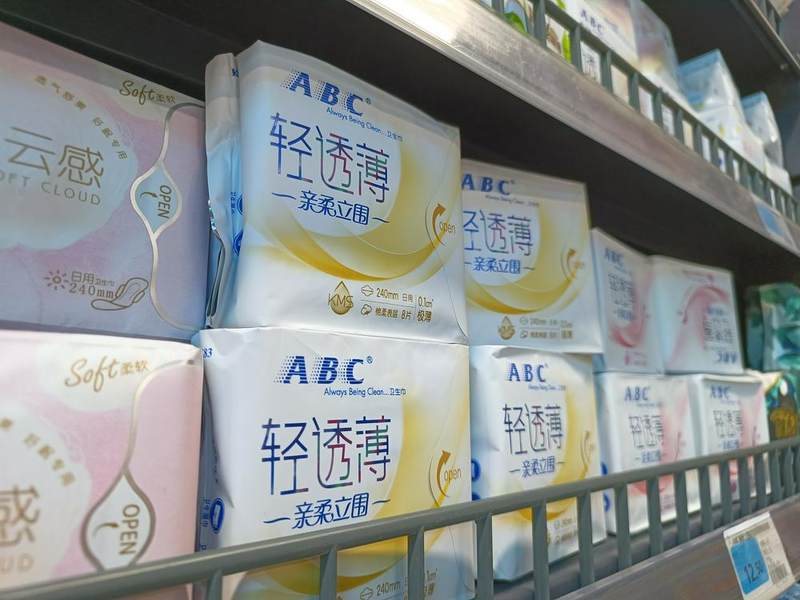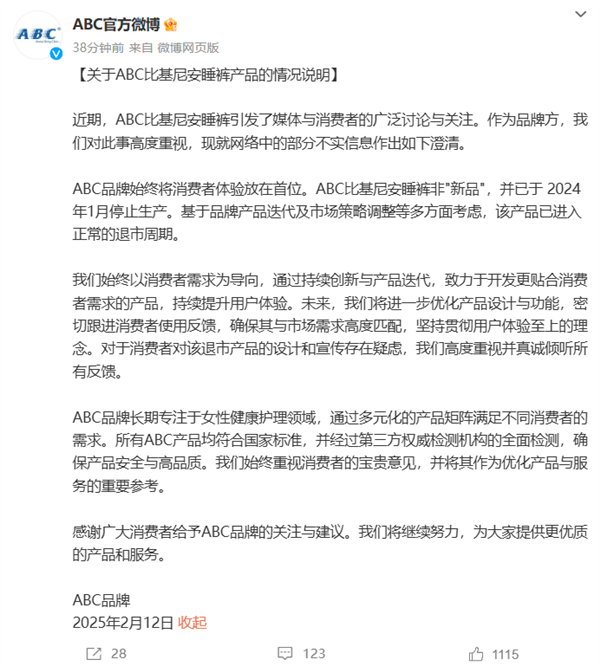In the field of women’s health consumption, brands need to be based on solid product power to avoid alienating innovation into marketing gimmicks.
Just before the “size shrinkage door” emerged, ABC sanitary napkins fell into the “menstrual sex controversy” again

Photo source: Visual China
Blue Whale News, February 12 (Reporter Wang Hanyi)Since the controversy over shrinking the length of sanitary napkins, ABC, a well-known domestic sanitary napkin brand, has once again been in controversy.
Recently, ABC launched a menstrual pant product called Bikini Pajama Pants, which focuses on concepts such as reducing the skin contact area by 40% to achieve freedom of dressing, in an attempt to attract young consumers with sexy labels.
However, in just one week, the product was criticized for hot searches due to design disputes, user doubts and brand trust crisis, and was eventually removed from multiple e-commerce platforms.
As of 18:30 on February 12, ABC official Weibo released a situation statement on ABC’s bikini sleepwear products, clarifying some false information.
ABC officials said that ABC Bikini pajamas are not new products and have stopped production in January 2024. Based on various considerations such as brand product iteration and market strategy adjustment, the product has entered a normal delisting cycle.
ABC officials said that in the future, it will further optimize product design and functions, closely follow up consumer feedback, ensure that it is highly matched with market demand, and adhere to the concept of putting user experience first.

Photo source: Excerpt from ABC’s official Weibo
In fact, the focus of this controversy stems from the deviation between design logic and user needs. For the sanitary napkin industry, it is a typical case worthy of warning.
According to ABC official publicity, bikini pyjamas adopt a triangular cut design, claiming that they can be suitable for wearing scenes such as tights and mid-waist pants to avoid exposing edges. However, consumers generally believe that the core needs of pyjamas are leakage-proof and comfort, rather than appearance or sexiness.
On social platforms, a large number of users pointed out that designs to reduce the contact area may increase the risk of side leaks, and the proposal to wear tight pants during menstruation violates common physiological knowledge.
What is more noteworthy is that some consumers question that the design is actually a disguised operation of cutting corners. Previously, ABC was accused of shrinking the number because the actual length of the sanitary napkin did not match the label, and the error rate was as high as 17%. The customer service couldn’t accept the response that they could not buy it even more angered users.
In this controversy, similar doubts were amplified again. Some netizens bluntly said: Does reducing the contact area by 40% mean reducing the number of materials used? Are brands transferring cost pressures?& rdquo;
This incident not only exposed the imbalance between innovation and user demand in the sanitary napkin industry, but also reflected the long-term accumulated trust crisis of the ABC brand.
In November 2024, its sanitary napkins caused an uproar due to length problems and customer service attitude. Although founder Deng Jingheng publicly apologized and promised to rectify, consumer trust has been seriously damaged.
In the bikini pyjamas controversy, the brand’s response once again exposed its shortcomings: on the one hand, customer service avoidance and communication lag. When the Blue Whale News reporter asked why the product was removed from the shelves, the Tmall flagship store customer service only suggested calling the official hotline, but the hotline operator said it was unclear and recorded the contact information, but there was no subsequent reply.
Although ABC’s incident is suspected of being an evil party, it cannot be ignored that the incident reflects the common challenges of the sanitary napkin industry.
According to relevant research data, the average retail price of sanitary napkins has increased at a compound growth rate of more than 3% in recent years, and the market size in 2028 is expected to exceed 120 billion yuan. Enterprises are facing pressure from rising prices of raw materials, but material-cutting innovation can easily trigger sensitive nerves of users.
Mainstream users of pyjamas are more concerned about leakage-proof, wrap-around and breathability than about sexy labels. Red Star News commentator Shang Yingying pointed out that innovation in menstrual products needs to give priority to basic functions rather than blindly pursuing marketing concepts.
In particular, after women’s consumption awareness is awakened, consumers ‘tolerance for brand edge marketing decreases.
Wang Min, an expert on consumer behavior, analyzed: ABC’s mistake was to forcibly bind freedom to menstrual needs. Women are more likely to choose safe and burden-free products during their periods than to pursue fashion. If brands ignore this mentality, no matter how dazzling the concept is, it will be difficult to work.& rdquo;
Financial commentator Li Hao believes that ABC’s difficulties are related to its listing pressure. Jingxing Health Care failed to launch an IPO in 2018. In recent years, its revenue growth has relied on the sanitary napkin business, accounting for more than 94% in 2017. It urgently needs new stories to boost confidence in the capital market. However, eager innovation exposes the short-sightedness of brand strategy.
Previously, ABC founder Deng Jingheng promised to achieve zero negative deviation in the national standard of products by March 2025, but this incident may once again delay the process of rebuilding trust.
In the field of women’s health consumption, brands need to be based on solid product power to avoid alienating innovation into marketing gimmicks. As netizens said: menstruation doesn’t need to be sexy, just need to be at ease.& rdquo;



